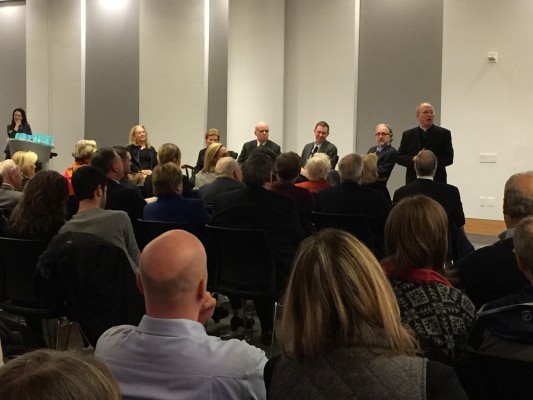James B. Donovan, Bridge Builder Then and Now
Rev. Joseph M. McShane S.J. introduces the panel before the “Bridge of Spies” screening. (PHOTO BY RACHEL JARVIS/ THE OBSERVER)
February 25, 2016
James B. Donovan is one of America’s unsung heroes, a lawyer who prosecuted German criminals at the Nuremberg Trials in 1945, defended and saved the life of a known Soviet spy and negotiated a prisoner exchange with Cuba. But before all of that occurred, he was deemed the best all-around man by the University in the Fordham College at Rose Hill (FCRH) graduating class of 1937. On Feb. 9, Fordham honored Donovan’s legacy and the impact he had on our country and school by screening the film “Bridge of Spies,” preceded by a Q&A with three of Donovan’s family members, moderated by Fordham Professors Christopher Dietrich and Jim Jennewein.
One of this year’s Best Picture nominees at the Oscars, “Bridge of Spies” is directed by Steven Spielberg and stars Tom Hanks as James Donovan. In the film, Donovan acts first as a defense attorney and later as a prisoner negotiator for Soviet spy Rudolf Abel, played by Mark Rylance. After Abel is apprehended by the CIA, Donovan is placed in charge of giving him the fairest defense possible, taking a job most would be afraid of.
Before the film screened, Donovan’s son and daughter, John Donovan and Jan Donovan-Amorosi, along with his granddaughter Beth Amorosi, discussed their father’s legacy and how much he did for our country that has since been forgotten. For example, John Donovan recalled how his father had taken him to Cuba in 1962 to negotiate for the exchange of over a thousand men, women and children during the Bay of Pigs Invasion, where they both dined and worked with Fidel Castro. Similarly, Jan Donovan discussed the differences between reality and the film, including how her father seemed to be even more dignified and humane in real life than even Tom Hanks could make him look. As impressed as she was by the film and by Hanks, the movie could never match the man who inspired it.
For lack of a better term, the film is very “Spielberg-ian,” possessing a tone and look that can be seen in a large number of the director’s more recent films. Stylistically similar to his “Munich” and “Lincoln” in both how the film is shot as well as how it makes you feel, “Bridge” is crafted in a calculated and precise fashion that looks pristine, but sometimes seems a bit hollow to me. Thankfully, the script from Matt Charman and the Coen Brothers is adept filling in the blanks left behind by Spielberg’s direction, both funny in its darkest moments and solemn in its lightest. The dialogue is snappy and delivered incredibly well by all involved, with Rylance shining in a crowded field.
Tom Hanks’s portrayal of Donovan is the highlight of the film, with the actor playing the role as well as anyone could. Were it not based on a true story, it would seem as if the character was written specifically for him. Hanks is one of the most proficient actors currently working, and here his performance is laden with every beat that could be hit, making a superhero out of a simple man. Considering most of the movie is based around conversations with little action other than spoken word, the weight of the film rests on him. Hanks is aided by the design of the film, with the cinematography and editing working to make legal battles and politics pop in a way that simple dialogue couldn’t easily do.
“Bridge of Spies” is a great movie that tells an amazing story, yet even this does little to capture James Donovan the man. But when you see the pride with which his family discusses their father and grandfather, you can’t help but think that no amount of stories told about Donovan will successfully capture who this American hero really was.













